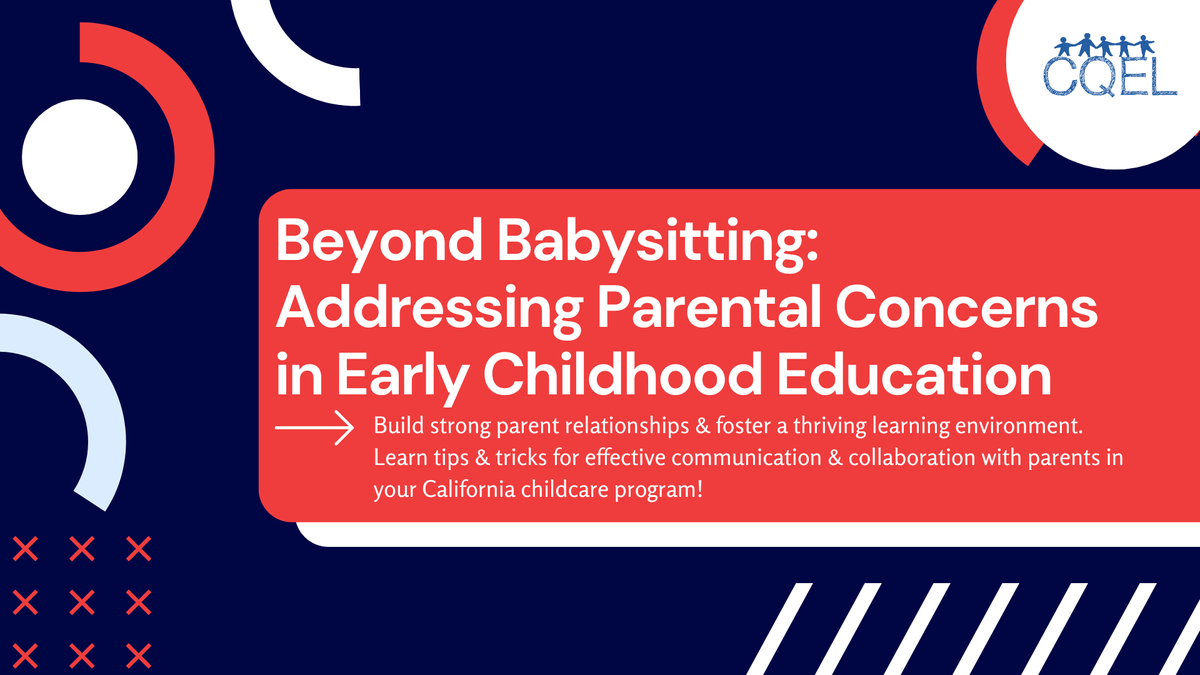Beyond Babysitting: Addressing Parental Concerns in Early Childhood Education
Build strong parent relationships & foster a thriving learning environment. Learn tips & tricks for effective communication & collaboration with parents in your California childcare program!

Building strong relationships with parents is the cornerstone of a successful childcare experience. Open communication and addressing parental concerns constructively fosters trust, creates a positive learning environment for children, and allows everyone to work together towards a child's well-being. As an aspiring childcare provider in California, here are some tips and tricks to navigate communication with parents and ensure a collaborative approach.
Building rapport with parents starts from the very beginning. Active listening is key – make eye contact, show genuine interest in their concerns, and ask open-ended questions. Establish clear communication channels – whether it's daily communication logs, a parent portal, or a designated app – to keep parents informed about their child's day-to-day experiences. Remember, respecting diverse parenting styles goes a long way. Acknowledge each family's unique needs and preferences while ensuring your approach aligns with California's Early Learning and Development Standards. Consider hosting regular parent-teacher conferences and open house events to create opportunities for in-depth conversations and strengthen the home-school connection.
Sometimes, parents may have specific concerns. Anticipate these and be prepared to address them proactively. Common concerns might include daily routines, developmental milestones, or behavior management. Here's where data becomes your friend. Use daily observations and developmental checklists to track a child's progress and provide concrete examples when addressing concerns. Remember, parents want to feel confident that their child is thriving. By using data and clear explanations, you demonstrate your commitment to a child's well-being and foster a sense of trust.
Of course, there will be times when conversations get challenging. Perhaps a parent disagrees with a behavior management technique, or maybe they have questions about a child's development. The key is to navigate these conversations with professionalism and empathy. Focus on solutions, not blame. Use "I" statements to express your perspective, such as "I've noticed that Johnny seems frustrated during transitions. Would you be open to discussing some strategies we can try at home and here at daycare?" Maintaining a positive and collaborative approach is essential. Documenting key decisions and next steps after such conversations ensures everyone is on the same page and avoids misunderstandings.
California offers a wealth of resources to support communication with parents in childcare settings. The California Department of Education's Parent and Community Engagement webpage (https://www.cde.ca.gov/ls/pf/pf/) provides information and tools for building strong partnerships between childcare providers and families. CQEL, Californians for Quality Early Learning (www.caqualityearlylearning.org), is another treasure trove of resources, offering guidance on addressing concerns, fostering collaboration with parents, and building trust through effective communication.
Open communication and strong relationships with parents are the pillars of a nurturing childcare environment. When parents feel informed, involved, and confident in the care their child receives, it creates a positive ripple effect. Children thrive in a collaborative atmosphere where parents and childcare providers work together as a team. So, embrace communication as a continuous process, hone your active listening skills, and remember – a little empathy goes a long way in building trust and fostering a positive learning environment for all the children in your care. After all, when parents and childcare providers work together, the possibilities for a child's development are endless.
